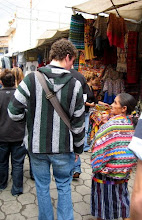Now we head to runoff, one month from now. Unfortunately, that means another month of campaigning and focus on the elections instead of important issues that need addressing now. It should be an interesting month, however, because even if all of Pedro's supporters vote "blanco" (that is, Lacalle), the Frente Amplio would still have more of the vote. Assuming the vast majority of "colorados" do choose to vote blanco, it comes down to the Others and Partido Independiente to decide the election. Anyway you look at it, it is going to be close.
I find it incredibly interesting to listen to the critiques of my friends. Pepe is characterized as a folksy but inept candidate who allegedly killed people during the guerrilla struggle against the dictatorship, while Lacalle is characterized as a shady, potentially dishonest fellow who allegedly dealt corruptly in his previous presidency. Surprisingly, his past presidency is rarely touched upon during the campaign and in the media. You'd think having 5 years of experience with this man everybody would be racing to breakdown what he did or did not do during those years to see what he can and may do during another presidency (especially if he was perhaps corrupt), but for some reason that's not the case. In the roughly translated words of one of my Pedro-supporting classmates that will vote Lacalle in the runoff, "I'd rather have a corrupt than a murderer [for president]." Interesting perspective, especially coming from the USA culture of war hero candidates being greatly ballyhooed (e.g. John McCain), while even candidates who participated in war but allegedly were not that involved in conflict are deemed unsuitable (see Al Gore).
In the other major issues, neither of the ballot initiatives passed. The vote to essentially get rid of amnesty for criminals on both sides of the dictatorship struggle only received 46% of the vote, and the vote to allow Uruguayans in the exterior to vote around 37%. I find it quite sad that the human rights of the families and friends of those who simply disappeared without explanation during the dictatorship will continue unaddressed, while the implicit suggestion that there is an untouchable class of people not responsible for their crimes persists. Granted, the politics of actually persecuting those criminals so many years later would be quite complicated, but sometimes the easy things in life are not the right things. As for the voting from abroad, the result probably reassures some of the present populace that they will not be subject to taxes or other propositions voted through by the 15-20% of the citizenship not residing in the country & therefore not subject to the effects (I got the number wrong in my last post), but is disappointing for those people who are still holding out for certain political changes they want a voice in before choosing to return to their homeland.
Got any questions about Uruguayan politics after these two posts? Email me!
